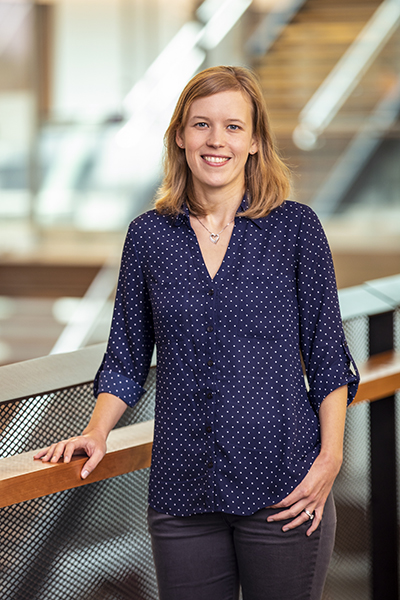Professor Franziska Roesner earns Consumer Reports Digital Lab Fellowship to support research into problematic content in online ads
(Cross-posted from Allen School News.)
As anyone who has visited a website knows, online ads are taking up an increasing amount of page real estate. Depending on the ad, the content might veer from mildly annoying to downright dangerous; sometimes, it can be difficult to distinguish between ads that are deceptive or manipulative by design and legitimate content on a site. Now, Allen School professor Franziska Roesner (Ph.D., ‘14), co-director of the University of Washington’s Security and Privacy Research Lab, wants to shed light on problematic content in the online advertising ecosystem to support public-interest transparency and research.
Consumer Reports selected Roesner as a 2021-2022 Digital Lab Fellow to advance her efforts to create a public-interest online ads archive to document and investigate problematic ads and their impacts on users. With this infrastructure in place, Roesner hopes to support her team and others in developing new user-facing tools to combat the spread of misleading and potentially harmful ad content online. She is one of three public interest technology researchers to be named in the latest cohort of Digital Lab Fellows focused on developing practical solutions for addressing emerging consumer harms in the digital realm.
This is not a new area of inquiry for Roesner, who has previously investigated online advertising from the perspective of user privacy such as the use of third-party trackers to collect information from users across multiple websites. Lately, she has expanded her focus to examining the actual content of those ads. Last year, amidst the lead-up to the U.S. presidential election and the pandemic’s growing human and economic toll — and against the backdrop of simmering arguments over the origins of SARS-CoV-2, lockdowns and mask mandates, and potential medical interventions — Roesner and a team of researchers unveiled the findings of a study examining the quality, or lack thereof, of ads that appear on news and media sites. They found that problematic online ads take many forms, and that they appeared equally on both trusted mainstream news sites and low quality sites devoted to peddling misinformation. In follow-up work, Roesner and her collaborators further studied people’s — not just researchers’ — perceptions of problematic ad content, and in forthcoming work, problematic political ads surrounding the 2020 U.S. elections.
“Right now, the web is the wild west of advertising. There is a lot of content that is misleading and potentially harmful, and it can be really difficult for users to tell the difference,” explained Roesner. “For example, ads may take the form of product ‘advertorials,’ in which their similarity to actual news articles lends them an appearance of legitimacy and objectivity. Or they might rely on manipulative or click-baity headlines that contain or imply disinformation. Sometimes, they are disguised as political opinion polls with provocative statements that, when you click on them, ask for your email address and sign you up for a mailing list that delivers you even more manipulative content.”
Roesner is keen to build on her previous work to improve our understanding of how these tactics enable problematic ads to proliferate — and the human toll that they generate in terms of the time and attention wasted and the emotional impact of consuming misinformation. Building out the team’s existing ad collection infrastructure, the ad archive will provide a structured, longitudinal, and (crucially) public look into the ads that people see on the web. These insights will support additional research from Roesner’s team as well as other researchers investigating how misinformation spreads online. Roesner and her collaborators ultimately aim to help “draw the line” between legitimate online advertising content and practices, and problematic content that is harmful to users, content creators, websites, and ad platforms.
But Roesner doesn’t think we should wait for the regulatory framework to catch up. One of her priorities is to protect users from problematic ads, such as by developing tools that automatically block certain ads or empower users to recognize and flag them. While acknowledging that online advertising is here to stay — it funds the economic model of the web, after all — Roesner believes that there is a better balance to be struck between revenue and the quality of content that people consume on a daily basis as they point and click.
“Even the most respected websites may be inadvertently hosting and assisting the spread of bogus content — which, as things stand, puts the onus on users to assess the veracity of what they are seeing,” said Roesner. “My hope is that this collaboration with Consumer Reports will support efforts to analyze ad content and its impact on users — and generate regulatory and technical solutions that will lead to more positive digital experiences for everyone.”
Consumer Reports created the Digital Lab Fellowship program with support from the Alfred P. Sloan Foundation and welcomed its first cohort last year.
“People should feel safe with the products and services that fill our lives and homes. That depends on dedicated public interest technologists keeping up with the pace of innovation to effectively monitor the digital marketplace,” Ben Moskowitz, director of the Digital Lab at Consumer Reports, said in a press release. “We are proud to support and work alongside these three Fellows, whose work will increase fairness and trust in the products and services we use everyday.”
Read the Consumer Reports announcement here, and learn more about the Digital Lab Fellowship program here.
Congratulations, Franzi!
